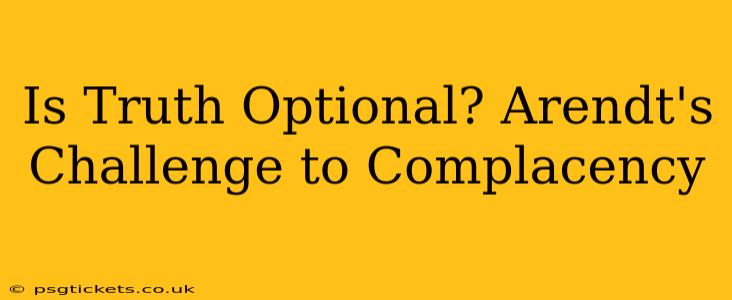Hannah Arendt, a towering figure in 20th-century political philosophy, compels us to confront a chilling possibility: the willful abandonment of truth. Her work, particularly her analysis of totalitarian regimes, exposes how the erosion of truth – a seemingly abstract concept – can pave the way for unimaginable horrors. This essay will explore Arendt's critique of the casual dismissal of truth, examining how her insights remain profoundly relevant in today's world, where misinformation and "alternative facts" proliferate. We'll delve into her key arguments and address some common questions surrounding her perspective.
What did Hannah Arendt mean by the "banality of evil"?
Arendt's concept of the "banality of evil," famously articulated in her Eichmann in Jerusalem (1963), challenges the notion that perpetrators of horrific acts are necessarily monstrous or driven by deep-seated malice. Instead, she argues that evil can arise from a terrifying normalcy, a thoughtless adherence to rules and procedures without consideration for their ethical implications. This "thoughtlessness," a failure to engage critically with the world and consider the consequences of one's actions, is precisely what allows individuals to participate in atrocities without experiencing profound moral conflict. This is not to excuse their actions, but to understand the mechanisms that enable such widespread participation in evil. Arendt suggests that the absence of critical thinking and a willingness to confront uncomfortable truths are foundational to the banality of evil.
How does Arendt's work relate to the problem of fake news and misinformation?
Arendt's insights resonate deeply with the contemporary challenges posed by fake news and misinformation. The deliberate spread of false narratives undermines the very foundation of public discourse. When truth becomes optional, replaced by competing narratives, it becomes increasingly difficult to distinguish fact from fiction, fostering distrust in institutions and experts. This erosion of shared reality creates fertile ground for manipulation and political extremism, mirroring the conditions that allowed totalitarian regimes to flourish. Arendt's emphasis on the importance of critical thinking and the active engagement with reality becomes even more crucial in the face of today's sophisticated disinformation campaigns. Her warning against the passive acceptance of received wisdom is a crucial antidote to the seductive power of fake news.
What is the relationship between truth and politics according to Arendt?
For Arendt, truth and politics are inextricably linked. She believed that a healthy political system requires a shared commitment to factual accuracy and a willingness to engage in rational debate. The deliberate distortion of truth, or the indifference to it, undermines the very possibility of meaningful political action. Without a shared understanding of reality, collective decision-making becomes impossible, replaced by a struggle for power based on competing narratives, propaganda, and manipulation. This explains why Arendt saw the suppression of truth as a primary characteristic of totalitarian regimes. These regimes did not merely lie; they systematically destroyed the very mechanisms – free press, independent judiciary, open discourse – that allow for the pursuit of truth.
Why is thinking so important in Arendt's philosophy?
Arendt placed immense emphasis on the importance of thinking – not merely intellectualizing, but a genuinely reflective engagement with the world. She viewed thinking as a crucial defense against the banality of evil. Through critical thinking, we can challenge assumptions, evaluate evidence, and resist the temptation to blindly follow authority or conform to prevailing narratives. Thinking requires a willingness to confront uncomfortable truths and to engage in self-reflection, making it a vital safeguard against the seductive allure of ideology and propaganda. This active engagement with reality is, for Arendt, the cornerstone of ethical action and responsible citizenship.
How can we combat the erosion of truth in the modern world?
Arendt's work offers valuable lessons for navigating the contemporary information landscape. Combating the erosion of truth requires a multi-pronged approach:
- Cultivating critical thinking skills: We must actively seek out diverse perspectives, evaluate sources critically, and resist the temptation to accept information uncritically.
- Promoting media literacy: Education in media literacy is crucial in enabling individuals to identify and resist misinformation.
- Supporting independent journalism: A free and independent press is essential for holding power accountable and exposing falsehoods.
- Fostering open dialogue: Engaging in respectful dialogue with those who hold different views can help bridge divides and promote mutual understanding.
In conclusion, Hannah Arendt's challenge to complacency remains profoundly relevant in an era saturated with misinformation. Her insights underscore the urgent need to cultivate critical thinking, defend the integrity of truth, and actively participate in the pursuit of a more just and informed world. Her work is a clarion call to reject the notion that truth is optional, recognizing that its erosion has far-reaching and potentially catastrophic consequences.

